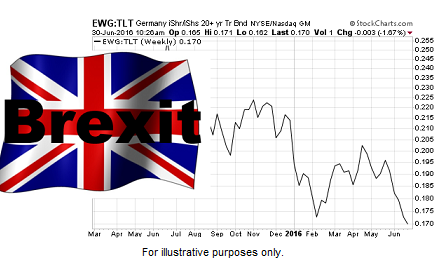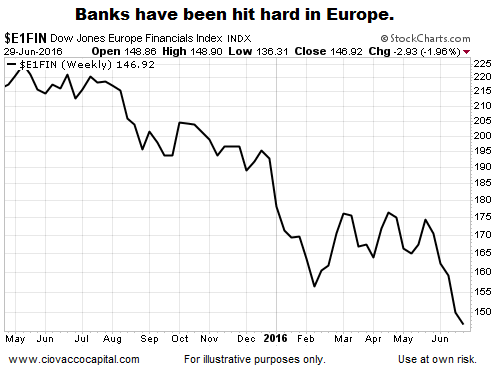Current Rally Impressive, But…
Stocks have staged an impressive rally off the recent Brexit low, which may turn into a push to higher highs. However, as noted on Twitter, the S&P 500’s chart currently contains two lower highs, and a recently printed new multi-month low. The chart may very well improve, but it has not yet. You can view the chart in more detail here.
Brexit: Serious Concerns Along With a Basis for Hope
George Soros spoke to the European Parliament Thursday in Brussels, something that has been widely covered in the financial press. His remarks expressed some grave concerns, but also covered the potentially positive and unanticipated aspects of the post-Brexit climate in Europe. In this post, we will water test his comments with present day market charts. From Bloomberg:
Britain’s decision to leave the European Union has “unleashed” a crisis in financial markets similar to the global financial crisis of 2007 and 2008, George Soros told the European Parliament in Brussels. “This has been unfolding in slow motion, but Brexit will accelerate it. It is likely to reinforce the deflationary trends that were already prevalent,” the billionaire investor said on Thursday.
Only time will tell if Brexit will have a 2007/2008-like impact on the markets. However, we can check Soro’s comments on deflation; was deflation a concern before Brexit and is it a concern now?
Attractive Investments Are Heavily Influenced By Inflation/Deflation
If we knew prices of consumer goods were going to rise at an annual rate of 5.0% over the next five years, a US Treasury-related investment paying 2.0% annually would not be particularly helpful in terms of protecting/growing our purchasing power. Conversely, if we knew consumer prices were going to remain fairly tame, or even decline, over the next five years, a 2.0% annual return starts to look a lot better, especially in the context of declining stock prices.
Are The Markets Favoring Inflation or Deflation?
Growth assets, such as stocks, tend to offer a better way to protect purchasing power during periods of rising inflation. As noted above, bonds tend to be more attractive during deflationary/bear market periods. Therefore, we can learn a lot by comparing growth-oriented assets to deflationary-friendly assets.
See Shilling: World Facing High Probability of Panic Deflation
The chart below shows the performance of German stocks relative to US Treasury bonds (TLT). The trend clearly favors deflation-friendly bonds, meaning the markets agree with Mr. Soro’s comments about deflationary pressures.
If we make the same comparison using the US-based S&P 500, the result still shows ongoing concerns of global deflation, high stock valuations, and waning economic growth.
If you prefer to view the question from another perspective, a June 23 post looks at the health of the inflation or weak dollar trade prior to the release of the Brexit results.
Brexit to Test European Banks?
Stock market volatility in 2011 was due in large part to concerns about the solvency of many European banks. During his visit to the EU Parliament, Mr. Soros commented on the ongoing health issues related to the European banking system. From Bloomberg:
Continental Europe’s banking system hasn’t recovered from the financial crisis and will now be “severely tested,” Soros said.
Prior to last week’s Brexit vote, were markets concerned about European banks? The chart below is self-explanatory. It should also be noted that even after this week’s rally in global stocks, European financial stocks entered Thursday’s session with a loss of almost 2% for the week.
Read Dr. Keith Barron on Helicopter Drops, Gold, and Brexit
We all remember the term systemic risk from the 2007-2009 financial crisis. The issue remains a concern after Brexit. From The Wall Street Journal:
Deutsche Bank AG is the riskiest financial institution in the world as a potential source of external shocks to the financial system, according to the International Monetary Fund. “Among the G-SIBs (globally systemically important banks), Deutsche Bank appears to be the most important net contributor to systemic risks, followed by HSBC and Credit Suisse,” the IMF said in its Financial Sector Assessment Program.
Will Others Follow the UK’s Lead?
Markets are always looking ahead. The violent reaction to Brexit was due in large part to questions about the stability of globalization trends and more directly questions about contagion in the European Union. From Bloomberg:
The UK’s decision meant “the hypothetical became very real,” Soros said on Thursday. “Sterling plunged, Scotland threatened to break away, and some of the working people who supported the ‘Leave’ campaign have started to realize the bleak future that both the country and they personally face. Will disaffected voters in France, Germany, Sweden, Italy, Poland and everywhere else see the EU benefiting their lives?” Soros asked. “If the answer is yes, the EU will emerge stronger. If the answer is no, it will eventually blow apart.”
Soros: Not All Gloom and Doom
Mr. Soros also noted the UK’s decision to leave the EU may be a catalyst for positive political and economic change. From CNBC:
“The Brexit vote was a negative shock but the tragedy no longer looks like a ‘fait accompli,’ George Soros said in a speech at the European Parliament on Thursday, and it has created “positive momentum for a stronger and better Europe.”…Adding that the vote for Brexit was a “great shock for him” Soros said the disintegration of the EU seemed practically inevitable last Friday morning, immediately after the vote…However, he said that while the referendum result was a negative surprise, the spontaneous response to it was a positive one. “People on both sides of the referendum, and most importantly those who didn’t even vote—particularly young people under 35—have become mobilized. This is the kind of grass roots involvement that the European Union has never been able to generate before.”











